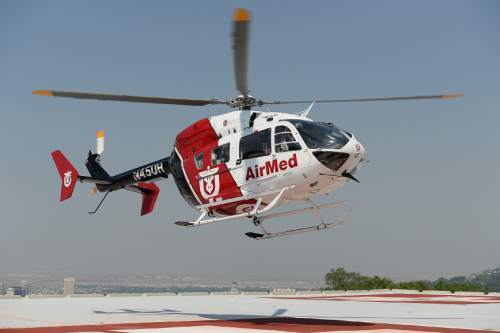This is an archived article that was published on sltrib.com in 2016, and information in the article may be outdated. It is provided only for personal research purposes and may not be reprinted.
Utahns transported by AirMed helicopters this summer — and for the next three years — may be automatically enrolled in the clinical trial of a drug designed to limit bleeding, unless they opt out in advance by June.
The University of Utah is participating in a national test, led by the University of Pittsburgh, of a treatment for trauma patients. If the blood-clotting drug is administered at the scene of an accident or during a helicopter ride to a hospital, it may prevent organ failure, infection or death, researchers believe.
Critics of this unusual type of clinical trial say any such medical testing should require patients' consent.
But Ram Nirula, University Hospital's chief of trauma and the U. study's lead investigator, says the trial is important because 1 in 4 people die when they have severe injuries and can't stop bleeding.
"We have a critical time frame where we need it," he said at a news conference Tuesday. "This drug may help us expand that window of time where we can get to them to save their lives."
Hospitals already administer the drug, called tranexamic acid, after trauma or heart transplant surgeries, Nirula said, but it has not been tested in helicopters.
There may be an added risk for people who are prone to seizures or blood clots, he said, but the drug still may be key in saving their lives.
Doctors typically must receive prior approval from patients before including them in trials. But University Hospital said the trial received an exemption to the federal rule because the severely injured people eligible for the treatment typically aren't capable of giving consent.
Beginning as soon as mid-June, trauma patients deemed to be at risk of "severe bleeding" and are transported by AirMed helicopters will be enrolled unless they are wearing a bracelet that says they do not want to participate. Pregnant women and people under age 18 also will be excluded.
Residents can call the hospital at 801-587-9367 or email staamp@hsc.utah.edu to receive the wristband by mail.
Those who caution against such no-consent studies include Nancy King, a professor of social science and health policy at Wake Forest University School of Medicine in North Carolina. King declined to comment on Utah's specific study, but she said via email Tuesday that there often are other ways to get important data.
Hospitals leading such trials often do a poor job of communicating with the public, she added. "They represent a mistaken exception to the information-sharing and the effort to obtain informed consent," King said, "that are central to good science, in my view."
University Hospital hopes to alert Utahns with a $5,000 public relations campaign. That's on top of an initial $100,000 from the Department of Defense to get the study started.
It is the only provider in the state involved in the trial. The hospital has not set a firm deadline to opt out or announced exactly when the trial will begin. It will be getting the word out via automated phone calls, advertisements on public transit and yet-to-be-announced information sessions across the Wasatch Front.
If its own standards board approves its awareness efforts, the U. will allow the treatments to begin, said Sarah Halbern, director of research for the university's surgery department.
Not everyone on Utah's AirMed flights will receive the drug. The lead investigators in Pittsburgh will compare the outcomes of people who got the treatment and others who did not.
The University of Pittsburgh Medical Center also hopes the trials will shed insight on how tranexamic acid works. For example, researchers aren't sure whether it acts as an anti-inflammatory drug, said Jason Sperry, Pitt's principal investigator. "There may be other beneficial effects."
At Pitt, three or four people called and requested the opt-out wristbands, while 63 who were flown to the hospital by MedEvac participated in the trial over the past eight months.
The University of Texas at San Antonio and the University of Arizona also are participating in the trial, expected to enroll 1,000 patients in the next three years. The sites were selected because their emergency response helicopters are relatively busy.
In 2008, three Utahns participated in a similar no-consent study of a blood substitute designed to help trauma patients. The state heath department signed off on PolyHeme despite news reports suggesting the drugmaker failed to disclose crucial details of a prior experiment. But no one in Utah received the treatment. Federal drug regulators ultimately declined to approve it.
Twitter: @anniebknox
aknox@sltrib.com Trial Information Sessions, 6-8 p.m. at all locations
Salt Lake City Library, April 11, 210 E. 400 South, Salt Lake City
Tooele City Library, April 12, 128 West Vine St., Tooele
Spanish Fork Library, May 2, 49 S. Main St., Spanish Fork
Park City Fire Department, May 16, 736 Bitner Road, Park City
Davis Hospital, June 14, 1600 W. Antelope Dr., Layton



